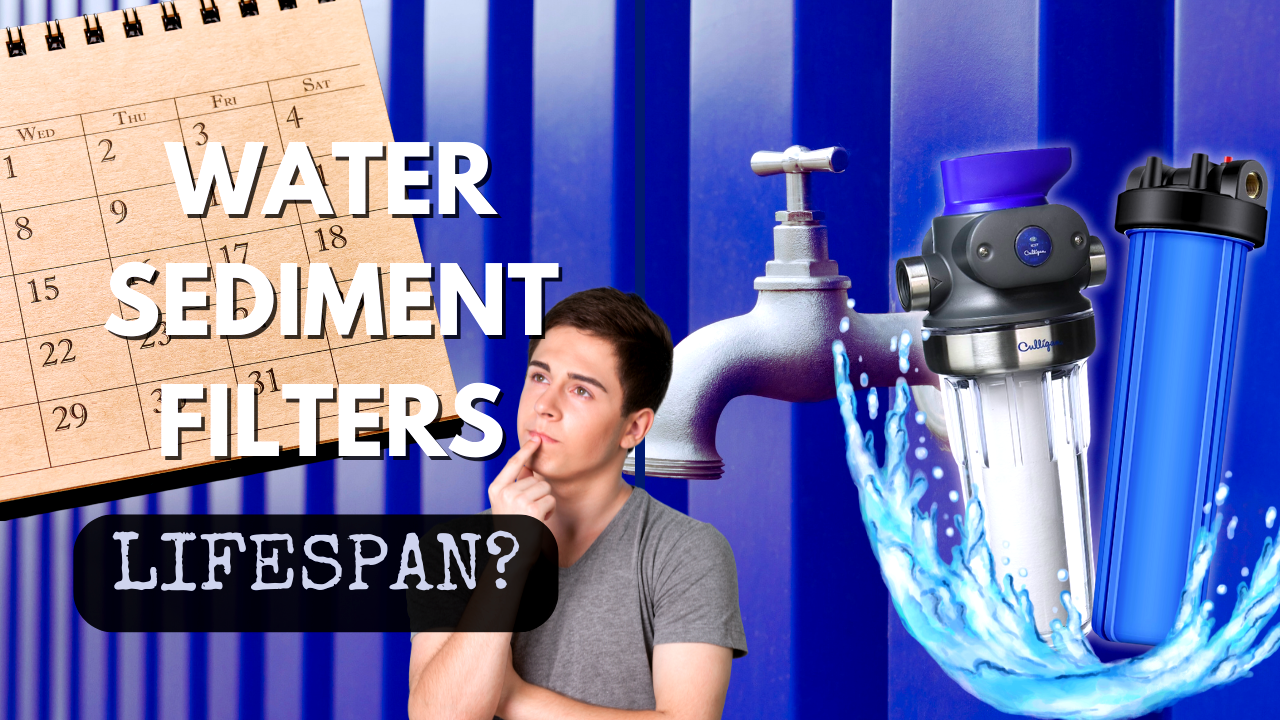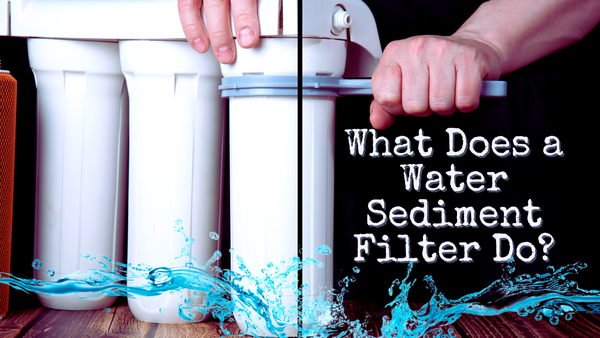Key Takeaways:
- The lifespan of a sediment filter varies based on water quality, usage, and filter type.
- Regular maintenance and timely replacements are crucial for optimal performance.
- Understanding filter lifespan factors can help ensure clean and safe drinking water.
Understanding the lifespan of a sediment filter is crucial to maintaining a healthy and efficient water filtration system. Sediment filters significantly remove particulate matter from your water supply, ensuring that your water is clean and safe for consumption. But how long do these filters last, and what factors influence their longevity? Let’s dive into the details. Sediment filters provide clean and safe filtered water by removing impurities affecting water quality and filter efficiency.
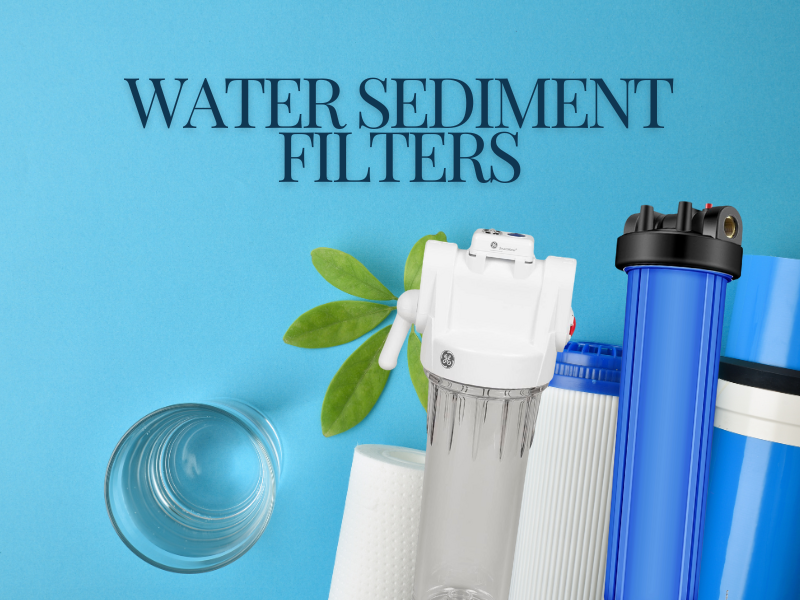
What is a Sediment Filter?
A sediment filter is a water filter that removes suspended solids like dirt, sand, and rust from your water supply. These filters are usually the first line of defense in a whole-house water filter system, protecting other filters and appliances from sediment buildup. By catching these particles, sediment filters improve water quality and extend the life of different filters in your system.
A sediment pre-filter catches larger particles to prevent clogging of subsequent filters, so it’s essential to replace sediment pre-filters regularly, every 3-6 months, especially in household systems or refrigerators.
Sediment filters come in pleated, spun, and string-wound filters. Each type has its advantages and is suited for different water conditions. For example, pleated filters have a larger surface area, so they are best for high sediment loads, while spun filters are better for finer particles.
How Long Does a Sediment Filter Last?
Several factors can affect the water filter lifespan of a sediment filter. One of the biggest factors is water quality. If your water supply has high sediment, you must replace your filter more often. If your water is relatively clean, your filter will last longer.
Water usage is another big factor. In households with high water usage, sediment filters must be replaced more often. This is because more water going through the filter means more sediment is being caught, which will clog the filter faster.
Water Quality and Sediment Filters

Water quality is a big factor in determining the lifespan of a sediment filter. If your water source is prone to high sediment, like well water, you must replace your filter more often. You must often replace your filter if your water has high dissolved solids or other contaminants.
Regularly testing your water quality will help you determine the best replacement schedule for your sediment filter. Knowing what contaminants are in your water allows you to choose the right filter and replace it at the right time.
Water Usage and Filter Life
The amount of water your household uses directly affects the life of your sediment filter. In households with high water usage like large families or households with multiple bathrooms, sediment filters will need to be replaced more often so you need to replace filters often to maintain water quality and system efficiency. More water going through the filter means more sediment is being caught which will clog the filter faster.
To make sure your sediment filter is working properly you need to monitor your water usage and adjust your replacement schedule accordingly. Install a water meter to track your water consumption and know when to replace your filter.
Maintenance for Best Performance
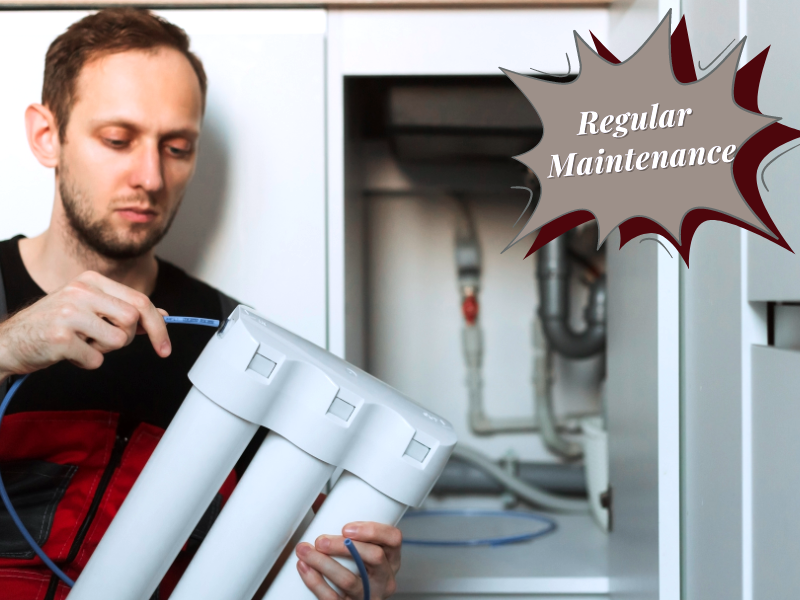
Regular maintenance is key to optimal sediment filter performance. This includes regular inspections and timely replacements. Keep an eye on your filter to prevent sediment buildup and keep your water clean and safe.
Replacing your sediment filter is also important to maintain other parts of your water filtration system including regular filter replacement. This includes cleaning the filter housing and checking for any wear and tear. Proper maintenance will extend the life of your whole system and keep it running smoothly.
How to Make a Sediment Filter Last Longer
Make a sediment filter last longer with regular maintenance and proper usage.
- Regular Cleaning: Clean the sediment filter regularly to remove any debris or sediment that may have accumulated. You can do this by rinsing the filter with clean water or replacing it with a new one. Regular cleaning will maintain water flow and keep your filter working.
- Proper Installation: Make sure the sediment filter is installed correctly and securely to prevent any damage or leaks. A properly installed filter will work better, last longer, and provide clean and safe drinking water.
- Monitor Water Flow: Monitor the water flow rate to ensure it’s within the recommended range for your sediment filter. A high water flow rate will reduce the life of the filter by clogging it faster. Monitoring and adjusting the flow rate will make the filter last longer.
- Replace Filter Cartridges: Replace the filter cartridges regularly to make sure the sediment filter keeps working. Even with regular cleaning, filter cartridges will eventually become less effective and need to be replaced to maintain water quality.
- Check for Damage: Inspect the sediment filter regularly for any damage or wear and tear. If you see any damage or the filter is no longer working properly, it’s time to replace it. Regular inspection will help you catch problems early and prevent bigger issues later on.
When to Replace a Sediment Filter

Here are the signs that your sediment filter needs replacement. One of the most obvious is low water pressure. As sediment accumulates in the filter, it restricts water flow, causing low pressure at your taps.
Another sign is a change in water quality. If you see more sediment or particles in your water, it’s time to replace your filter. If your water tastes or smells different, it’s also a sign that your filter is no longer working.
Sediment Filters in a Whole House Water Filter System
Sediment filters are part of a whole-house water filter system. They remove particulate matter from your water supply to protect other filters and appliances from sediment buildup. This will improve water quality and extend the life of other filters in your system. Activated carbon filters remove contaminants like chlorine and heavy metals to further improve water quality and safety.
In a whole-house water filter system, sediment filters are the first stage of filtration. This means they catch the bigger particles before the water goes through other filters like carbon filters or reverse osmosis filters. By doing so, sediment filters will make sure your whole system works efficiently and effectively.
Filter Replacements
Water filters need to be replaced regularly to keep your water filtration system working. Over time, sediment filters can get clogged with particulate matter and become less effective. Replace your filter at the recommended interval, and you’ll have clean water.
Besides improving water quality, filter replacements can also extend the life of your whole system. By preventing sediment buildup you can protect other filters and appliances from damage and they will continue to work efficiently.
How to Choose the Right Sediment Filter

Choosing the right sediment filter for your water filtration system is crucial for ensuring optimal performance. There are several factors to consider, including the type of filter, the size of your household, and the quality of your water supply.
When selecting a sediment filter, it's important to consider the specific contaminants in your water. For example, if your water contains a high level of sediment, a pleated filter with a larger surface area may be the best option. Conversely, if your water contains finer particles, a spun or string-wound filter may be more suitable.
The Impact of Water Source on Filter Lifespan
The source of your water can also impact the lifespan of your whole house's water filters and sediment filters. For example, well water is often more prone to sediment and other contaminants, which can shorten the lifespan of your filter. Conversely, municipal water supplies are typically treated to remove sediment, resulting in a longer filter lifespan.
Understanding the specific characteristics of your water source can help you determine the optimal replacement schedule for your sediment filter. Regular testing and monitoring of your water quality can also help you identify any changes that may affect your filter’s performance.
The Role of Sediment Filters in Removing Contaminants
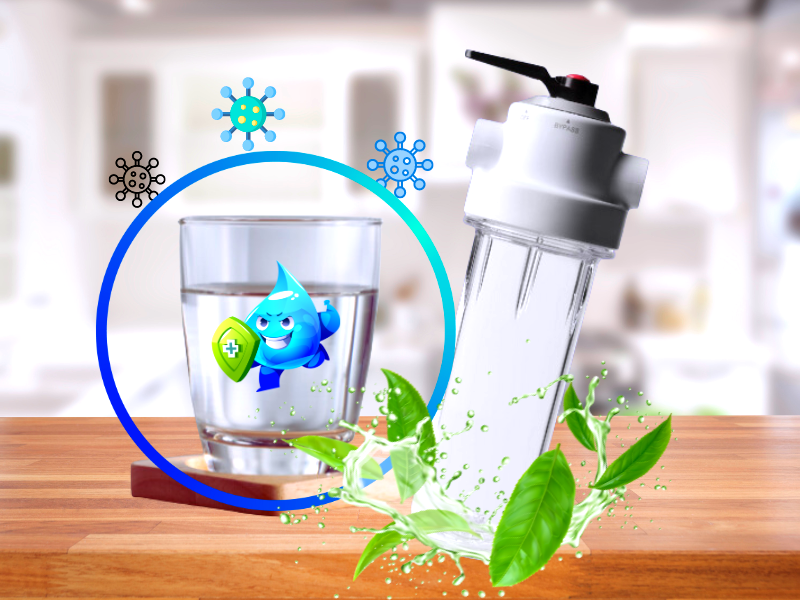
Sediment filters play a vital role in removing contaminants from your water supply. By capturing particulate matter, these filters help improve water quality and protect other filters and appliances from damage. This is particularly important in households with high water usage or water sources prone to sediment.
In addition to removing sediment, some sediment filters are also designed to capture other contaminants, such as chlorine and volatile organic compounds. By choosing the right filter for your specific needs, you can ensure that your water remains clean and safe for consumption.
Summary
Understanding the lifespan of a sediment filter is crucial for maintaining a healthy and efficient water filtration system. Several factors, including water quality, usage, and filter type, can influence the lifespan of your filter. Regular maintenance and timely replacements are essential for ensuring optimal performance and clean, safe drinking water.
Keep up with the latest water filter tips and offers, and subscribe to our newsletter today!
FAQ
How often should I replace my sediment filter?
The frequency of sediment filter replacements depends on several factors, including water quality, usage, and filter type. Generally, it's recommended to replace your sediment filter every 3 to 6 months. However, households with high water usage or poor water quality may need to replace their filters more frequently.
What are the signs that my sediment filter needs replacement?
Common signs that your sediment filter needs replacement include a decrease in water pressure, changes in water quality, and unusual tastes or smells in your water. Regular inspections and monitoring of your water quality can help you determine when it's time to replace your filter.
Can I clean and reuse my sediment filter?
Some sediment filters, such as pleated filters, can be cleaned and reused. However, it's important to follow the manufacturer's instructions for cleaning and maintenance. In most cases, it's more effective to replace the filter to ensure optimal performance and water quality.
